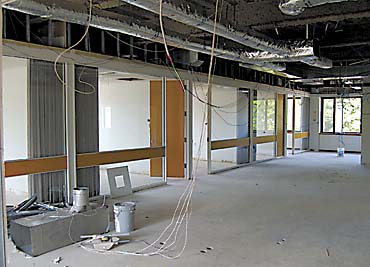THE HUDSON VALLEY'S NEWEST OLD NEWSPAPER | |||
| |||
|
Keep The Change
Officials Offer Explanations For Village Hall Renovation Costs
As the date for Ellenville's offices to move to the new village hall building draws closer, eyebrows have been raised over the numbers presented at the last Village Board meeting on September 24.
As reported in that week's Ellenville Journal, there were twenty-four 'change orders' submitted by contractors working on the renovation and preparation of the old Provident Bank Building, which will house village government starting in mid-October. The original bids for the building's renovation totaled $468,990. At last check, the building's renovation has cost nearly $850,000. Two of the larger change orders, a term referring to changes to plans and estimates encountered during the work-phase that "could not have been anticipated," were overhauls of the lighting system in the building's two stairwells, as well as upgrading the entire building's fire alarm system so as to bring it up to code. The estimated costs of these two change orders came to $17,300 and $20,100, respectively, and have some people questioning why they weren't included in the original bid submitted to the village board. According to Village Manager Elliott Auerbach, Building Code Enforcement Officer Brian Schug, and Glenn Gidaly, a representative from the village's engineering firm, Barton and Loguidice, there are several reasons why the items were not accounted in the original bid. For a change order to be approved, it must first go through a consultation with the engineers and with Schug, who determines if it meets with regulations. It is then presented to Auerbach, who acts as the on-site representative of the village, and who has the power to either approve or deny the change order's implementation. Gidaly's explanation for the stairwell lighting expense stems from the inefficient nature of the fluorescent lights installed in the building decades ago, when it was originally built. "The electrician put in his bid having nothing to do with stairwell lighting," says Gidaly. Operating 24 hours a day, 7 days a week, the existing stairwell lights burned regardless of whether or not anyone was in the building. Complicating matters further, some of the stairwells' lights were "non-functional or inoperable." Gidaly and his company saw an opportunity for the village to save some money in the long run by changing the light system entirely, rather than simply fix up an old, inefficient system. "We went back to the village and said, 'they have these new kind of lights now that are highly efficient, that are motion-detecting, and they are highly-efficient bulbs,'" added Gidaly. With the new system in place � functional stairway lighting systems are necessary for a building to receive a certificate of occupancy � the lights in the stairwells are now motion-sensitive. Once motion is no longer detected, the lights stay on for seven minutes, after which the stairwell goes completely dark, saving money and increasing energy efficiency. The reason behind the fire alarm system's exclusion from the initial bid: the building's 'as-built' plans were inaccurate. "Basically, the system that they showed on the drawings was not the system that was actually installed back in 1989," says Schug. "Once they actually started taking walls down and looking at the kind of wiring that was in place from the old fire alarm system, it wasn't the same system that was on paper per se, from the existing building. So it was different than what the village and our engineers were led to believe from the previous plans." Gidaly has the same explanation, but also cites the village's need to make sure that all floors of the building comply with current fire codes, not only the three floors for which the original bid had stipulated. "We were charged with the demolition and rehab of the basement, first, and second floor of this building," says Gidaly. "Our job was to fix those floors, do whatever you have to do, to make sure that they meet code, that they're safe� to make sure that the fire alarm system meets the current code. Once the job got started, it became very evident to the village that they had the opportunity to use the additional floors. So the change order� has to do with 'devicing out' the entire building." The term 'devicing out' refers to engineers' need to update all safety and regulatory devices throughout the building. Finally, as to why the board itself wasn't notified of these changes as they became necessary, Auerbach explains that, as village manager, it is in his job description to make on-site decisions in order to expedite the renovation process and help things run smoothly. "Part of my powers and duties, as enumerated in the village code, is that I 'act as the purchasing agent for the village,'" says Auerbach, reading from the code directly. "I'm charged as one of my COO [Chief Operating Officer] duties, to be the purchasing officer, and it even goes further to say, 'to supervise and prepare any necessary documents necessary for obtaining bid materials, equipment, or capital projects.' I supervise and control all expenditures of the village. I'm also the village's budget officer. So the manager�acts as the chief operating officer or any of those other duties that the board so prescribes him or her to do." The first Village Board meeting to take place in the new Village Hall is scheduled for October 22. Village government wants to offset the costs of the building's purchase and subsequent renovations with the old building's sale, which Auerbach expects to have sold within the next six months. The new village hall's operating costs are to be offset by renting out the third, fourth, and fifth floors of the building, which Auerbach hopes to have finalized within the next week.
Copyright © 2007, Electric Valley Media Corp.
All Rights Reserved. |

|

